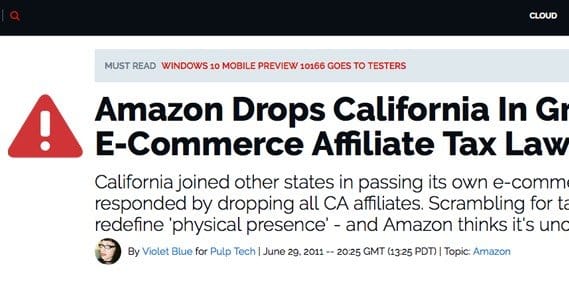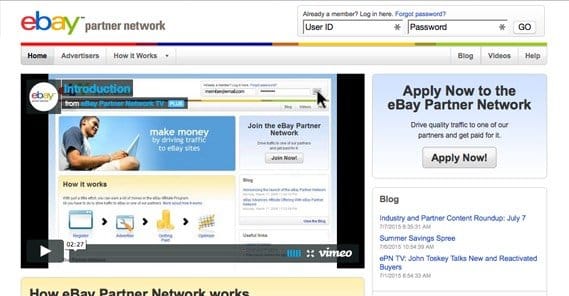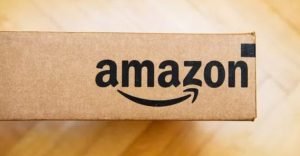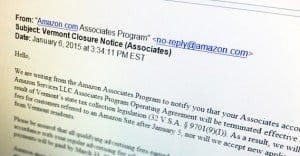10 Alternatives to the Amazon Associates Affiliate Program

There are dozens of affiliate networks out there, but one of the most widely known and widely used is Amazon’s affiliate program. With good reason; it has a lot going for it, least of all the immense brand recognition of carrying the Amazon name.
Still, there are a few good reasons why you might want to use a program other than Amazon. Heck, you might just want to use one in addition to Amazon, to double up on your potential earning power through different means of marketing.
Let’s take a look at Amazon’s Affiliates program, what makes it good, and what you can replace it with should you desire to do so.
Why Amazon is a Great Affiliate Program
Before we get into negatives and alternatives, we should first discuss what makes Amazon Associates a great affiliate program. I do this not to convince you of the greatness of Amazon, but to show you what you should be looking for in another program if you want it to compete with Amazon.
It’s easy to set up and get running. It’s only a matter of minutes to set up an account, and you don’t need to pass some detailed inspection of your site as a publisher. Many affiliate programs vet their publishers, because they don’t want spam sites and sites with low volume on their system. Amazon doesn’t have to worry about that; they’re big enough to take the hit from low volume publishers, and they can filter spam sites on an ongoing basis. You can have a functioning account set up in a matter of minutes.
It has a lot of tools, features and reports. Amazon is a provider of a lot of cloud-based services, including significant resource-hogging processes, so data analysis and reporting is no problem. They do lack real time reporting, which is unfortunate, but the reports they offer stretch back as far back as 2008 and are very granular. That’s not to mention the tools that make it easier to use Amazon affiliate links. These days it’s a one-button process to generate a custom affiliate shortlink you can use on your site.
Amazon is one of the biggest and most trusted brands in the world. This is something no other affiliate program can replicate, though some will come close. Amazon has global name recognition and trust. People feel a lot more comfortable buying something through Amazon than they do through a third party website or a small business site. Amazon has a whole host of price match guarantees, support options, return policies and deals to back up its position as a global retailer. As an Amazon affiliate, you can take advantage of all of those as additional sales factors as well.
Some valuable products can have exceedingly high commissions. One of the big gripes about Amazon is the low commission rates, but I’ll talk more about those later. Here’s the thing; Amazon hasn’t been just about books in a very long time. Sure, 4% of a $3 book isn’t a lot. On the other hand, 4% of a $10,000 piece of electronic equipment is significant. You’re not stuck getting pennies on sales of nearly free ebooks.
Amazon seasonal sales can dramatically increase your conversions. Two words: Black Friday. Amazon is chock full of sales and deals, from their standard sales to their preorder bonuses to their seasonal extravaganzas. As an affiliate marketer, you would typically be unable to take advantage of sales, or would find them actively harmful. With Amazon, they’re so good they can’t help but benefit your site.
You can find just about anything you could possibly want to sell. How many products would you guess are on Amazon at any given time? Recent statistics indicate a number around 250 million items. That’s an insane number, considering you can make a commission off of pretty much all of them. No matter what you want to sell, you can find it on Amazon, and you can earn a commission for selling it through them.
You can earn commissions on products you didn’t sell. This is perhaps the best part. With most other affiliate programs, you need to sign up for an offer an sell that product through that offer. If the customer goes on to buy something else, you get nothing. With Amazon, anything the user buys when they reach the site after you refer them will earn you a commission. You could refer them for a $10 book and they remember they wanted to buy a $1,000 TV; you get the commission on the TV as well.
Reasons You Might Want an Alternative
Unfortunately, all is not sun and rainbows with Amazon Associates.
The affiliate program has a few drawbacks, which range from minor to deal-breaking. If you’re looking for an Amazon alternative for affiliate marketing, chances are you’ve already encountered at least one of these.
The commissions are generally quite small, both in percentage and in raw value. This is, really, the biggest complaint about Amazon. Commissions start at 4% and stay there for electronics. For most other products, they can increase as a factor of monthly performance. Sell more during a month, and you’ll get a larger commissions out of the products you sell after the threshold. It resets every month, though, so you really need volume to make it work. And it really is about volume, not value; even if 100 books doesn’t equal half a TV, selling that TV won’t bump you up, while the 100 books will.
The affiliate cookie stops working after 24 hours. When you refer a user to Amazon, the tracking code activates. It stays active for the duration of one day, after which it disappears. If the user takes 25 hours to make a decision and purchase, well, that’s it. You don’t get a commission, because the tracking code expired. This means for large purchases, like expensive electronics, you can lose out. People like to take their time before making large purchases, and that time is enough to let your code expire. If the user then goes back to Amazon directly, rather than through your link again, there’s no tracking code and thus no commission to be paid.
There’s a lot of competition for the best niches. Despite the fact that there are hundreds of millions of products available, there aren’t always nearly that many products selling regularly. If there’s not much demand, you won’t make much from the affiliate sales, will you? The high volume, high value niches already have established competition, which can be difficult to fight. Of course, this isn’t so much different from the various high value offers on other affiliate networks.
You might not be eligible for the program, or you may have been banned. Obviously, if you can’t access the program, you can’t use it to make money. You need an alternative that will perform as well as you can get it to perform.
Even Amazon can fail. There was a time when they nuked California’s ability to use the program, for example. No company is too big to fail, or rather, no company is too big to break something small marketers rely on to live. If you were one of the Amazon affiliates users to lose your account overnight, you know the pain. If nothing else, finding a good Amazon alternative gives you a fallback in case Amazon falters or your account disappears.
The Ten Alternatives
I know by now you’ve probably skipped down to the list itself and you’re not reading this. If by chance you’re still here, let me just say that this isn’t by any means a comprehensive list. I make no guarantees as to the quality of these networks, beyond the basic level of not-spam assurance you get from anyone reviewing affiliate networks. Whether or not you manage to put these sites to use and actually sell products, well, that’s up to you.
- The eBay Partner Network – This one has a long and spotty history with marketers. For a long time, they’ve been taking something of a back seat to many other affiliate networks. The reason it’s at the top of the list is because it’s always improving, including recent acquisitions and changes. It also passes a few of the Amazon tests; for example, it’s a widely known global name and there are millions of products available for sale.
- Infolinks – This site isn’t strictly an affiliate network, and as such it has a wider range of options beyond “a link with some tracking code attached.” They have monetized text links, search results, article tags and sidebar framed ads. They’re maybe not the most common of networks, but they’re effective and they have a reputation to maintain.
- Skimlinks – Like Infolinks, Skimlinks is one part affiliate marketer and one part PPC ad network. It functions as a valid replacement for both AdSense and Amazon Affiliates, if you use it properly. They’re also working with over 15,000 advertisers, giving you a pretty good selection of products to sell. It’s no Amazon quarter billion, but nothing is.
- CJ Affiliate by Conversant – This affiliate network has gone through several changes over the last few years, so you’ll see it referred to as Conversant, CJ, or Commission Junction. Over the course of these rebrandings, it has morphed into one of the most professional and high quality networks online today. They also have a decided technological lead over other affiliate systems, including Amazon.
- Rakuten Marketing – Rakuten is the name of the former Buy.com merchant, and their affiliate marketing program Linkshare is incredibly potent. Buy was perhaps the closest thing Amazon had to a true piece of competition, and it’s a bit of a tragedy that they’ve been shunted off to the side over the last half decade. That said, they’re easily among the top five affiliate networks in the world, and they’re well worth investigating.
- Clickbank – Clickbank has a bit of a spotty history largely stemming from the evolution of rules for affiliate marketing over the last few years. They suffered a bit from legally required affiliate disclosures, and they don’t have the best product selection or software to back them up. What they do have, though, is the first point I made about Amazon; entry-level acceptance. Pretty much anyone can register for Clickbank and be ready to rock in a matter of minutes.
- VigLink – This network is a more content-driven affiliate system, in that it’s very dynamic and deterministic. Rather than manually choosing your offers and products to promote, you simply write content as best you can. VigLink actively monitors your content looking for opportunities to link to specific products with affiliate links. When it finds them, you get a link embedded automatically, and can make money without paying much attention at all.
- Avangate – A relative newcomer to the scene of affiliate marketing, Avangate is a huge multi-faceted company with offerings beyond just affiliate networking. They have financial services, publishing services, tech support, legal services, and a whole lot more. Through it all, they’re achieving success through customer service and data access.
- ShareASale – This one is really a polarizing network, and you can tell why just by looking at the site. They boast nearly half a million products to sell, largely in fashion and a few related industries. They’re broad within their niche, but narrow in terms of niche. Give them a shot, but don’t bank everything on success with them alone.
- Other Big Name Brand Affiliates
When all else fails, and you want to keep with the retail affiliate game, you can always investigate other retail affiliate programs. Etsy, Walmart, Target, Best Buy and Home Depot all have affiliate networks. Barnes and Noble also has one, if you’re really into the books theme from Amazon rather than the massive retailer theme.
Finding Success with Affiliate Programs, Amazon or Not
Amazon is undoubtedly easy to sell through, and that’s a problem when you’re looking for Amazon alternatives. It’s difficult to make sales, particularly at volume, so you need to know what brings about success and how to get it all working in your favor.
First, you need traffic. Without the benefit of getting commissions on products you didn’t link directly to, you need more traffic to sell more products in order to make your sales goals. There are entire blogs dedicated to growing your traffic – you’re on one right now – so I won’t cover this in detail here.
The second factor that encourages conversions is trust. Amazon has this going for it in name recognition, but most other affiliate networks don’t. That’s why you don’t know their names; they have no name recognition so they try to hide as much as possible. Some networks take the opposite route, though it’s up to you if you want to trust one that does.
You’ll also need to pay attention to user intent. Darren Rowse of ProBlogger.net tells the story of his photography school blog. He noticed that even though his traffic was growing, his conversions weren’t. Some investigation showed that the problem was his content. His content was attracting people who had bought a camera and wanted advice using it, while he tried to sell cameras. He needed to adapt, to bring in people looking to buy and recommend cameras to them. That’s what you need to be doing; getting the right kind of users in just in time to convert them.
Relevance, of course, is important. If you were Darren Rowse, but you were trying to promote links for buying bulk candy or for small, specialty beads for crafting, you’re accomplishing nothing. Your product links need to be relevant to your content and to the goals and attitudes of your readers.
At the end of the day, what tends to sell the most is genuine product recommendations. If you can’t honestly recommend a product, and have to make up some kind of review content, it will show. People who know what they’re talking about can call you on your bullshit, while you won’t come across as convincing to the people who don’t know already.
Information, then, is the king. A good, detailed product review is better than a hundred thin blog posts mentioning that you used X product and oh by the way, here’s a link to it if you want to buy it.
One of the benefits Amazon has over the rest is their deals; if possible, cut deals yourself. This allows you to adapt to seasonal changes by trading volume for profit in many cases.
All that said, if you can use Amazon, you probably should. If you can use Amazon and one or two of the others on this list at the same time, that’s even better.
Avoid putting all of your eggs in the same basket. You never know what might happen, and you don’t want to be caught with your marketing pants around your promotional ankles right when it matters the most.

 ContentPowered.com
ContentPowered.com









internigt
says:Are you sure that one can be Affiliate of Amazon and other sites at the same time?
Kimhak
says:Is it possible to use homedepot affiliate program with amazon affiliate program in a single website?
James Parsons
says:Hey Kimhak, yes this shouldn’t be an issue. There’s nothing in their rules that mention using other services in conjunction with Amazon.